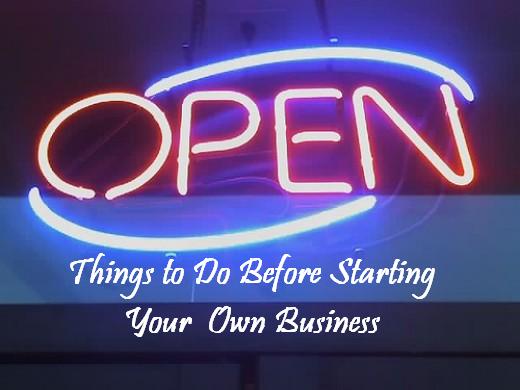Things to Do Before Starting Your Own Business

Starting your own business can sound like an exciting prospect. You can make your own hours and come and go as you please. No boss will be breathing down your neck or tell you what to do.
However, you probably know that most new businesses fail in the first year, and you want to make sure that you avoid the same fate for your endeavor. What can you do to make sure that your business starts off in a healthy way?
Before you hand in your resignation to your current employer, you can start preparing to get your business off to a healthy start. In this way, you will be better able to know what is in store for you, and you can ensure that your business will start off in a positive way.
Save up some money
When you open a business, it may take some time for you to get clients and earn revenue. In the meantime, you still have to eat and take care of your living expenses. By saving up money for six months to a year's worth of expenses, you can make sure that you are able to give your business enough time to succeed. Don't forget that you will also need enough money to pay for any loans you obtained to get your business off the ground.
While you still have a job, save as much money as you can from each paycheck so you can build a proper cushion.
Line up your networks
You will need a network of suppliers for your business. Instead of waiting until you open your business, you can scout out prices and find the best places to purchase your supplies.
You will also need a network of people who have expertise in the field. Meet with them and learn as much as you can before you quit your job. Find out about the positives and negatives of the business, how to avoid the pitfalls of the particular business or industry, and how to grow the business most efficiently. You may be able to find retired professionals who can mentor you and help you start and grow your business successfully.
Be sure to take the time to consider your family's needs, and prepare them for the extra time you will spend at your new business in order to make it successful.
Create a business plan
You will need a business plan to present to the bank if you want to borrow any start-up funds from the bank, but even if you don't want to borrow money, it is a good idea to create a formalized business plan. This will help you think about the various aspects of the project, including finding a good location, doing a market analysis to make sure that the business will do well in that location, considering the competition, and considering a pricing strategy. It will help you learn about your strengths and weaknesses before you start.
Many people have a passion for a particular industry, but forget to take into consideration that they will have to do the billing, bookkeeping, sales, and customer service in addition to producing the goods and services that are the mainstay of the business. If you are not competent in these tasks, you will want to make sure you include hiring out for these services in your business plan.

Learn about the business and industry
In order to save money, you may want to take some classes to learn about the topics that are your weaknesses. In this way, instead of hiring out the work, you can learn how to perform these tasks yourself as well. Taking some accounting or marketing classes may help you learn strategies to start your business on a more successful course.
You also want to learn about all aspects of the industry and business as you can. Besides taking classes, you can also talk to as many people as you can that are in the industry, read industry journals and be as informed as possible about industry trends and new developments. There are many free resources including SCORE, SBA, and the Women's Economic Development Agency where you can talk to industry professionals and veterans who will help guide you.
Your new start-up
Starting a business is a risky proposition, and you can reduce your risk by trying it out on a limited basis before you quit your regular job. By following the advice in this article, you will be sure to:
- save up some money
- line up your networks
- create a business plan
- learn about the business and industry
All of this knowledge and the cash will help you consider your strengths and weaknesses, and find ways to enhance your strengths while minimizing or finding ways around your weaknesses. The time you take to do these tasks will also help show whether you have the determination and motivation it will take to grow your new business.








